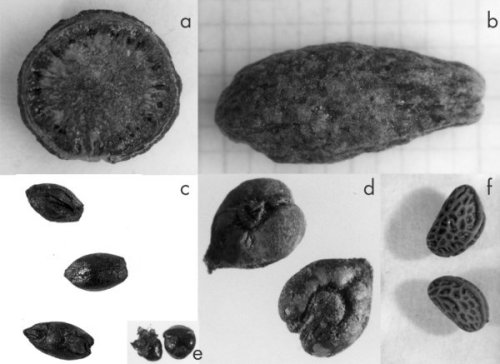 Institute of Archaeology Institute of Archaeology |
[Slovenian] |
| Home | Members | Programme | Projects | Laboratory |
| Database | Publications | Library | Links | Archive |
|
HOČEVARICA - an eneolithic pile dwelling in the Ljubljansko barje Marjeta JERAJ 3 HOČEVARICA: FIELD RESEARCH, A PRESENTATION OF THE MATERIAL FINDS AND THE SCIENTIFIC ANALYSES Abstract Paleobotanical investigations of the Hočevarica pile dwelling comprise of analyses of the plant macro-remains from the cultural layer and pollen from the archaeological profile. The remains of seeds and fruits suggest that dwellers were collecting fruits such as acorns, stones of cornelian cherry, hazelnuts, grapes, raspberries, strawberries and the fruits of water chestnut, but they were also cultivating barley and wheat. Beside numerous orach seeds and charred cereal grains, which represent one of the oldest archaeobotanical finds from the Ljubljansko barje, agriculture was further documented by a large amount of cereal pollen. The entire pollen record from the cultural layer reflects the vegetation development during the settlement period. It shows a significant human impact on the surrounding landscape, especially the reduction of nearby forest and usage of the cleared land for farming. The remains of macroscopic charcoal indicate that hazel, alder and ash wood was most often used as fuel. Radiocarbon dates of organic sediment and seeds from the cultural layer indicate the period between 3670 and 3380 cal BC (2 sigma).
*** 2004, (Opera Instituti Archaeologici Sloveniae, 8), 328 pp, 208 b/w or color photos, figures and charts, 20 x 29 cm, hardcover, ISBN 961-6500-28-7. |
